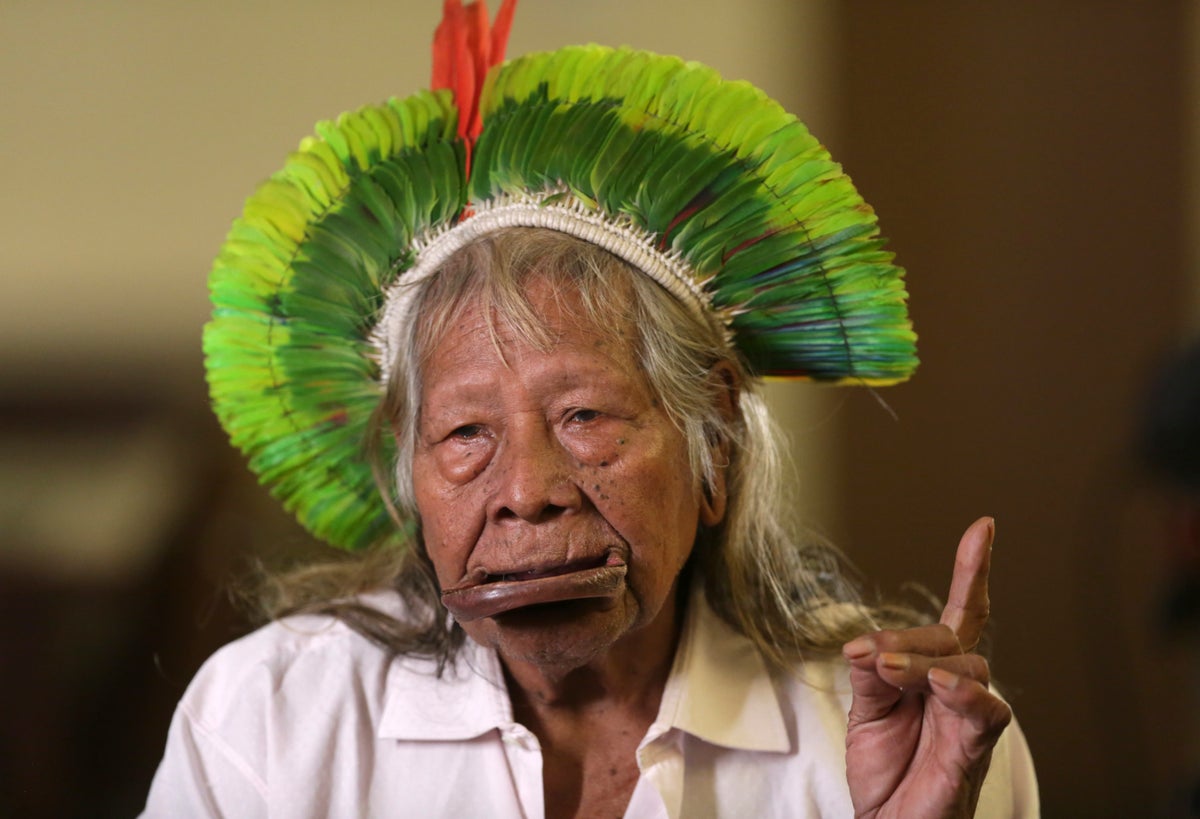
The Amazon's most famous Indigenous leader called upon Brazil's president on Friday to defend the rights of Indigenous people. Chief Raoni Metuktire demanded that “invaders” be removed from their territories and that the government stop negotiations on carbon credits that had excluded Indigenous people from the discussions.
In a letter to President Luiz Inácio Lula da Silva, Raoni demanded a government response to 11 specific requests by Aug. 9, the second and final day of the Amazon summit that Lula and other South American heads of state will attend in the city of Belem.
The manifest was handed over to the minister of the Indigenous peoples, Sonia Guajajara, at an event attended by 1,000 members of different ethnic groups in the town of Sao Jose do Xingu in the state of Mato Grosso.
Lula in May signed legislation paving the way for a market to trade carbon credits — generated by reducing greenhouse gas emissions that cause climate change, and which may be purchased to comply with eventual limits on emissions. Lula's administration is reportedly drafting regulation for the carbon market's operation and plans to present it in the coming months.
But Raoni said in his letter that Indigenous people have not been included in the process, and that their participation is required for the drafting of just legislation that takes their rights into consideration.
Raoni, now in his 90s, also demanded the government take a “concrete position” on an upcoming court ruling that threatens to strip some Indigenous territories of their designations. The Supreme Court is in the process of evaluating whether Indigenous peoples must have been physically occupying their territories before 1988 in order to uphold their land claims.
For years, Raoni has campaigned for the protection of Indigenous territories in the Amazon. A 1978 documentary, "Raoni: The Fight for the Amazon,” contributed to his fame, as did a 1989 tour with British musician Sting.
The letter also demanded a halt to mining activities that have triggered a health crisis among the Yanomami people during the previous government of far-right President Jair Bolsonaro as illegal gold miners swarmed into their territory.
Lula’s government has spent months expelling most of them from Yanomami lands. Some remain, however, working at night to avoid being caught, Rodrigo Agostinho, the head of environmental agency Ibama, said earlier this month.
Raoni's letter also demanded mass testing of Indigenous people for exposure to mercury — widely used by gold prospectors to separate the metal — and medical treatment for those affected.
It also condemned so-called “agricultural partnerships” set up under Bolsonaro that forced Indigenous people to work in farming, saying they are “unconstitutional and go against the model of cultural sustainability.”
Friday's event in Sao Jose do Xingu also showcased a letter from Britain's King Charles expressing support for Raoni and noting a common desire to see the Amazon protected.
As a way of safeguarding their land, Brazil's Indigenous people have pushed for establishment of more Indigenous territories, a slow process that can take years. Brazil has so far established 732 Indigenous territories, occupying more than 117 million hectares (453,000 square miles) — or nearly 14% of the country's vast expanse, according to data from the Instituto Socioambiental.
Of 14 territories that the government said would be created, only six have been established so far under Lula's latest, third term in office that started in January. However, deforestation in the Amazon rainforest has dropped 33.6% in his first six months from the same period of 2022, an encouraging sign for his administration’s environmental efforts.
Lula campaigned last year with pledges to rein in illegal logging and undo the environmental devastation under Bolsonaro. Raoni walked alongside Lula up the presidential palace's ramp before his inaugural address on Jan. 1.







